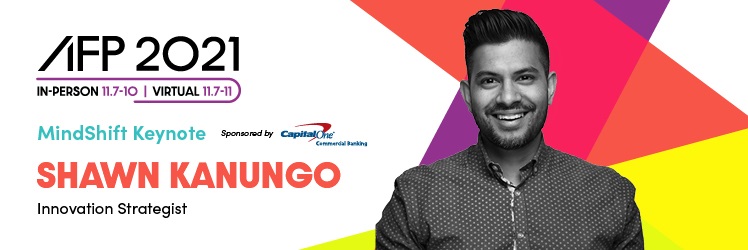Articles
The Creative Revolution in Finance Profession Requires A Mindshift
- By AFP Staff
- Published: 6/14/2021

According to globally recognized innovation strategist Shawn Kanungo, the coronavirus pandemic changed everything. For years he’s been preaching the value of an innovation disruption mindset to organizations and their leadership, a concept that had too often been agreed with, only to be followed by inaction. The technology was at their fingertips, and yet the finance profession, in large part, continued on with what was comfortable, what they’d “always done.” Until they couldn’t.
“The biggest impediment for innovation is that people don't know it's actually at our fingertips. It [the pandemic] gave us the permission to go off and try new ways of doing things,” said Kanungo. These “new things” included e-commerce, working from home and the use of Zoom. Leading the way in emerging and impactful technologies for the finance profession are artificial intelligence and blockchain.
“We're entering into a creative revolution [in the finance profession],” said Kanungo. “To be honest, that's the piece I'm much more excited about than any technology — the creative capabilities of finance professionals.”
The role of the CFO, the way they have been trained in the profession, has been all about being risk averse. However, in today’s world, not innovating is the riskiest thing a CFO can do — with inaction, they risk affecting their influence in an organization.
“CFOs have to be better,” said Kanungo. “They have to be better marketers. They have to be better innovators. They have to be able to take more risks.”
That said, in order for the CFO to lead in innovation, they need to be at the table where the conversations are happening. “When I'm speaking with larger organizations, the CFO is not normally at the table. But in smaller organizations, they are. The CFO should be at the table. The CFO should be the one leading the digital transformation efforts within the organization.”
That last part may surprise you. Kanungo went on to explain that innovation doesn’t provide a clear-cut return on investment. “Innovation is much more about creating luck, creating serendipity more than just having an X-sized return at the end of it,” he said.
“Innovation is about looking at your entire organization and asking, ‘Where can we innovate in processes, in brand, in customer experience, not just in product or technology?’ We need to expand the metrics when it comes to innovation,” said Kanungo. “And I think that's actually the CFO's job to help persuade the organization that there are different metrics to look at when it comes to its investments in digital or innovation.”
According to Kanungo, this requires a change in mindset, an exponential mindset. It requires you to come into work each day asking yourself: how do I take a risk that may change my trajectory and change the trajectory of the organization?
“The beautiful thing about innovation is that it's actually permissionless,” said Kanungo. “It’s in the hands of everyone, whether you're the CEO or the CFO or the intern.” No matter what your position is in the organization, those with an exponential mindset come to the organization asking how they can innovate everything they do. It’s also considering how they can unlearn, meaning continuously challenging themselves to discover new ways of doing a task or finding new people who can teach them new methods.
“Talent is ubiquitous in the sense that you can actually get global talent from everywhere,” said Kanungo. “There are no more barriers. If you can think more broadly about your work, about the talent, about knowledge and the fact that it's really all in your pocket, then you'll start to grab this whole idea of an exponential mindset.”
Utilize people outside of your comfort zone or outside of whom you traditionally would think would get the work done for you, advised Kanungo. Understand that you have an entire global ecosystem at your fingertips. Bringing in diverse teams, people with diverse thinking, is going to be so much more important as we move into the future.
Those with an exponential mindset have a broader vision or mission of where they want to go, and failure is part of the equation. “You're going to take shots,” said Kanungo. “You're going to be experimental and try new ways of doing things, and not everything is going to work.”
In a large organization, that's tough. It requires a huge culture change. “Psychological safety is number one,” said Kanungo. “Showcase to every single individual that they have the ability to go off and innovate. Empower people with not only the tools, but also the freedom to go off and innovate.”
Performance management is key. “Within most organizations, if you try to innovate, and I see this in finance a lot, we slap people on the hand and say, ‘Well, you tried something new. It didn't work, never do it again,’” said Kanungo.
“This is the greatest time to be in finance, but it requires us to actually go off and make the change, because we can really turn our profession into the sexiest job in the world,” said Kanungo. “It's going to be a lot more about creativity and empathy and being imaginative and problem solving.
“As technology eliminates some of the tasks that we've had, as we move into this world where you might have technologies like blockchain eliminate even some of the core services we provided, this is the turning point.
“We're at the start of a revolution when it comes to finance. Right now is the turning point. Re-imagining this profession is now.”
To build a “Disruption DNA,” treasury and finance professionals must be prepared to abandon the set of ideas and practices that may have made them successful. Don’t miss Shawn Kanungo’s MindShift Keynote, sponsored by Capital One, at AFP 2021. Save $375 when you register for AFP 2021 by June 25. Register here.
Copyright © 2024 Association for Financial Professionals, Inc.
All rights reserved.

